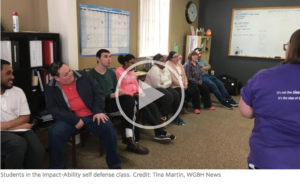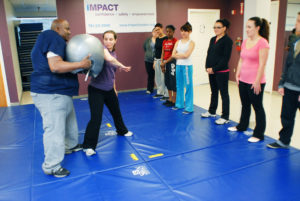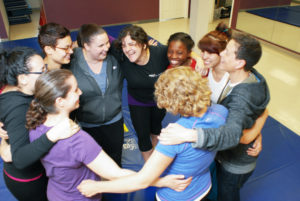International Women’s Day & Finding Empowerment in IMPACT
IMPACT is a program of Triangle, Inc.
As this year’s International Women’s Day approaches, I find myself reflecting on my journey to a profession that would enable me to make a difference for women in an unexpected way. In September 2017 I interviewed for the Program Coordinator position at IMPACT, a position that would have me primarily teaching self-defense. I was excited but I had a few reservations. As someone who sees violence against women and other targeted demographics as a systemic/community problem, I had been skeptical of self-defense as a vehicle to solve that problem because it seemed like that would be putting the onus on the wrong people. I recalled my first week at my all-women’s college when we had an assembly about safety and we were given rape whistles. I wondered if the men at the co-ed colleges down the road were sitting down for assemblies about dismantling rape culture (or if they were given rape whistles too, given that men can also be targeted for sexual violence). I was fairly certain the answer was no.
Since starting the job at IMPACT, I’ve learned that when self-defense is done right, it doesn’t feel like an authority figure handing you a whistle and telling you to limit your life by not drinking, not running with headphones, etc. It feels like learning how to manage your adrenaline and own your strength in situations you hope you won’t ever face. It also feels like learning to identify threatening behavior and listen to your intuition, and learning to assert your boundaries in everyday situations that unfortunately all of us do face.
It isn’t an accident that IMPACT classes feel empowering as opposed to fear-mongering or victim-blaming. Self-defense has been through an evolution in the past few decades—one that has been inspired and informed by survivors’ stories and what we’ve learned about perpetrators, risk factors, and trauma. The model that has emerged is called empowerment self-defense (ESD), and while other models still exist, organizations like IMPACT, which focus on broader goals like abuse prevention and community safety, have embraced ESD.
Anti-violence educator Lynne Marie Wanamaker calls empowerment self-defense “a uniquely holistic, evidence-based, survivor-centered, feminist approach to self-protection skills.”[1] Each of these components is majorly important, but I’m going to hone in on “evidence-based” for this piece.
Most people’s conception of gender based violence is influenced by sensationalized news stories (woman running through the park at night is attacked by stranger). However, this perception isn’t representative of what we know about violence against women; the reality is the perpetrator is much more likely to be someone we know—an acquaintance, friend, or partner. Given this, IMPACT classes always include scenarios that help students practice skills that can be used to identify troubling behavior, establish healthy boundaries, de-escalate conflict, and stay safe around familiar people.
NPR listeners may remember a series in January highlighting the prevalence of sexual assault and abuse against people with disabilities. The reporters revealed that people with intellectual disabilities are sexually assaulted at 7 times the rate of people without disabilities. This is a devastating statistic of which IMPACT is acutely aware, which is why in 2010 we worked with The Robert Wood Johnson Foundation to develop a self-defense program specifically designed for people with intellectual disabilities (this program, IMPACT:Ability, was featured in a WGBH story following the NPR series). We teach IMPACT:Ability across schools in the greater Boston area and to participants in Triangle programs, and all of IMPACT’s courses teach skills that are adaptable and accessible no matter the student’s body type or fitness level. Our goal is to give our students tools they can use effectively regardless of whether an attacker is bigger or stronger than them, and the skills we teach are accessible to any student.
Those are just a few examples of how the evidence informs our work. And although being evidence-based should be a given, since we live in a society that so often ignores evidence when designing systems and policy, I find it shockingly refreshing when a program actually pays attention to what is happening and responds accordingly. Empowerment self-defense is about listening to research and listening to women, LGBTQ folks, trans people, people of color, people with disabilities, and all survivors.
Is self-defense THE solution to the epidemic of violence in this culture? No. But rarely is there one solution to a pervasive problem. I do think that empowerment self-defense is part of the solution, and not just on an individual level. Taking a class can challenge and deepen a student’s understanding of boundaries and consent, it can prepare a student to be an effective bystander when witnessing violence, and it allows students to practice staying calm in adrenalizing situations, which is essential to not only defending oneself but also to employing de-escalation tactics—a skill that is useful in many broader community contexts.
And if we want to know how effective ESD is, we can do as ESD does and follow the evidence. According to a 2015 study reported in the New England Journal of Medicine, taking an empowerment self-defense class cuts college women’s risk of rape nearly in half.[2] This great Huffington Post article goes into more detail on why ESD isn’t more available for women across the US, and why it should be.
My concluding message for women on International Women’s Day 2018: there are a lot of reasons to be enraged this year and, as always, there are a lot of reasons to feel unsafe. Despite this, I hope you do whatever you can for yourself to feel empowered—whether that’s taking an empowerment self-defense class, challenging cultural norms that harm or alienate you, getting politically active, or whatever it is that works for you. I personally advocate for all of the above.
To learn more about IMPACT Boston and it’s programs, visit their website here.
[1] http://www.lmwsafe.com/32-what-is-empowerment-self-defense



